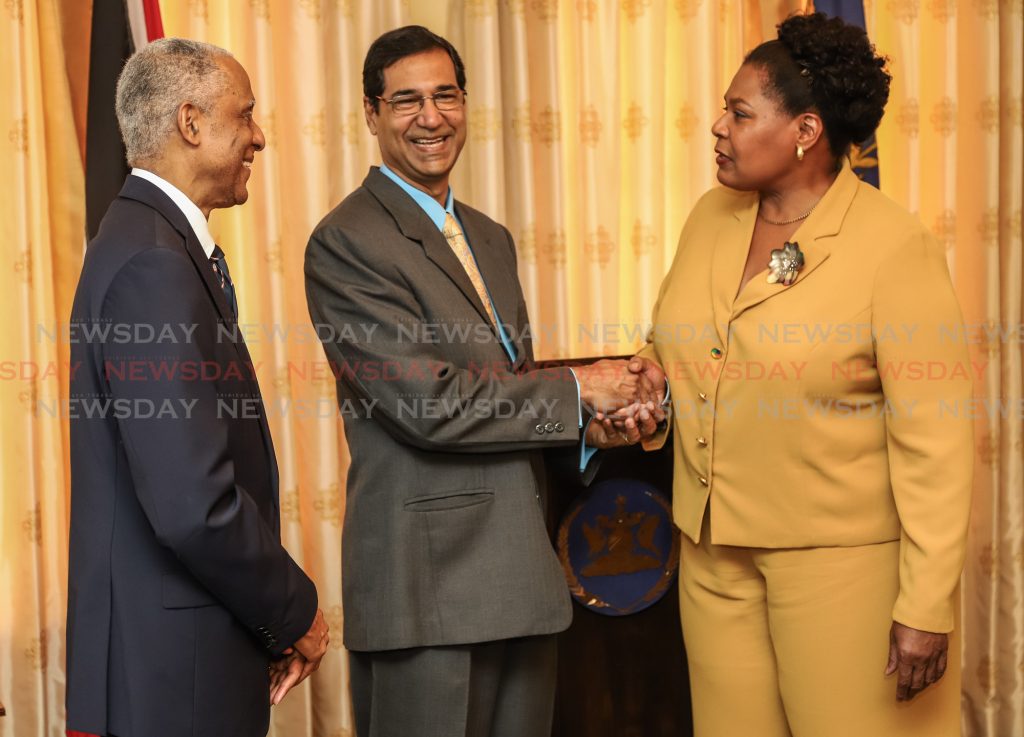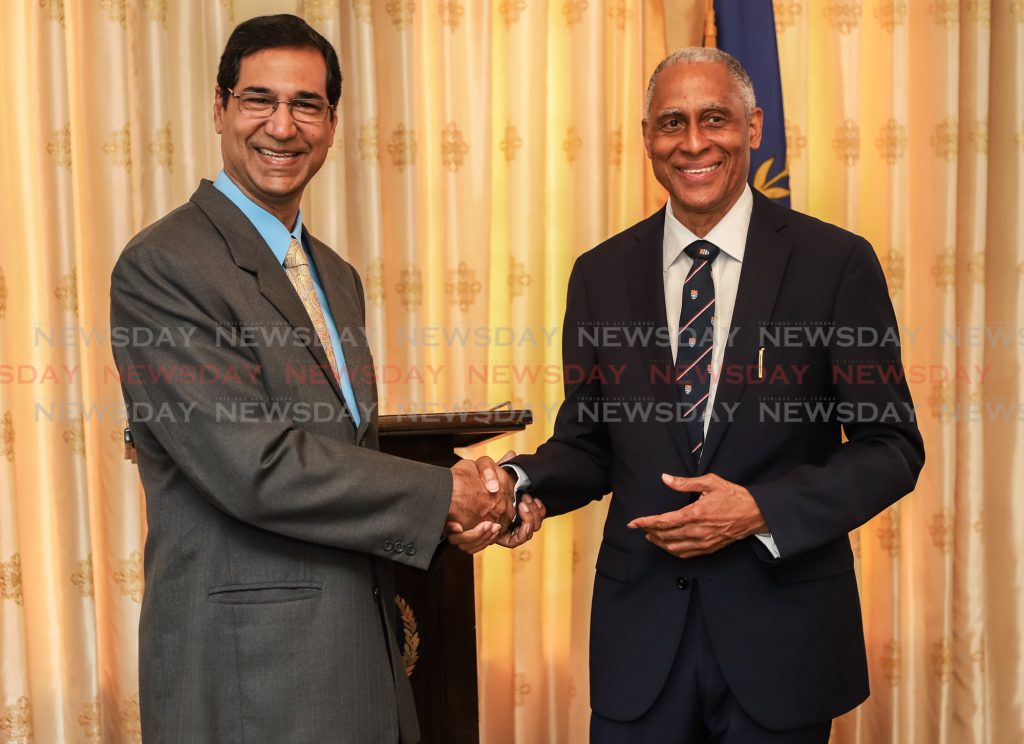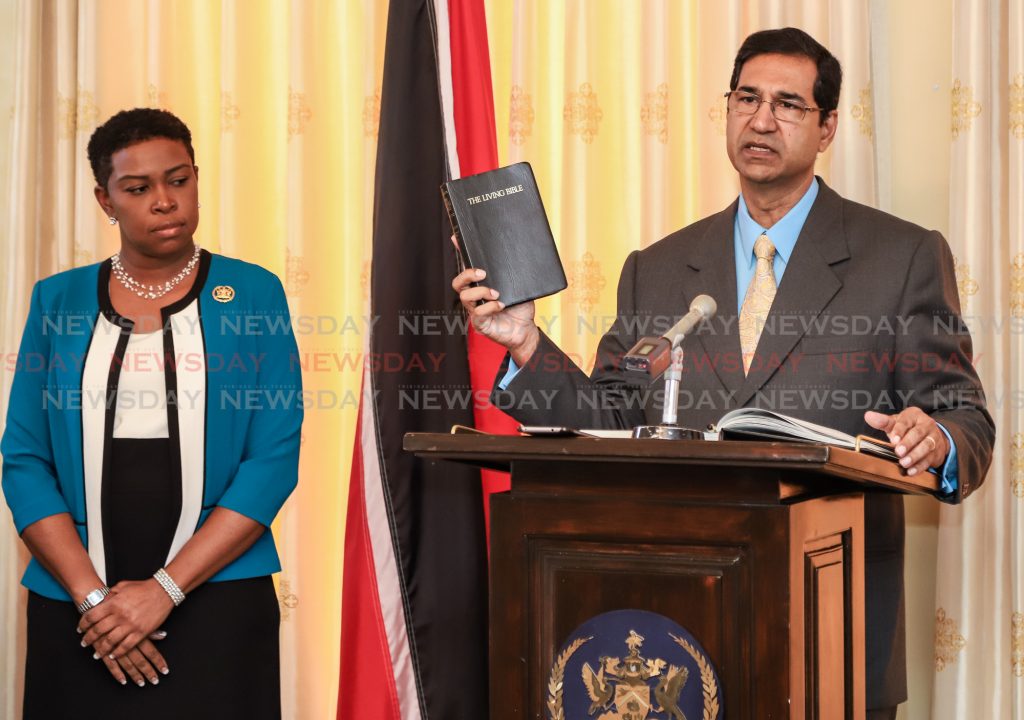Jamadar sworn in as CCJ judge

Justice Peter Jamadar was sworn in as a judge of the Caribbean Court of Justice (CCJ) at the residence of President Paula-Mae Weekes in St Ann’s yesterday.
After the reading of a proclamation on the President’s behalf, Justice Jamadar was asked to take the oath of his new office.
As to why the swearing-in took place at President’s House, her communications adviser Cheryl Lala said the agreement establishing the CCJ says a judge of the CCJ must take an oath of office before the head of state of any contracting party.
She said Jamadar had said he wanted to do it in his home country and the Regional JLSCasked for President Weekes to administer the oath.
After the oath was taken, Justice Adrian Saunders, president of the CCJ, said jurists from Australia, Botswana, the US, UK and nationals of many different Caribbean countries had sought to fill the vacancy. But after considering all their qualifications, experience and skill sets, the applicants' moral character, their intellectual and analytical ability, the soundness of their judgement, their integrity, and their understanding of people and society, Jamadar was selected.

Saunders said: “I have known Justice Jamadar for a long time. His judgements are erudite and well-reasoned. They demonstrate a high intellect, a deep understanding of Caribbean society and an abiding sense of fairness. Unsurprisingly, several of those judgements have been cited with approval by judges of both the CCJ and the Judicial Committee of the Privy Council.”
Saunders then welcomed Jamadar to the CCJ, Caricom's highest court, and congratulated him on his “well-deserved elevation. And I must warn you that you will be required to hit the ground running, as both the volume and complexity of our cases have been steadily becoming greater,” he said.
Jamadar, who has been a judge for 22 years, began his acceptance speech by saying: “Justice exists for the good of all people and society. Judges, upon whom the obligation of dispensing justice lies, therefore have a great responsibility.
“Today I take up a seat in the CCJ. I am both proud and humbled. For any Caribbean jurist and legal practitioner, one of the pinnacle achievements must be to sit as a judge of the CCJ. It is at once an office of great status and of even greater service.”
Recognising how important the CCJ has become, Jamadar cited the cases of Sam Maharaj vs the PM of TT in 2016, the AG of Barbados v Joseph and Boyce (2006), the Maya Leaders Alliance case against the AG of Belize and an appeal from Jamaica, Jamaicans for Justice v the Jamaican Police Service Commission.
He said: “This cross-referencing by the Privy Council of the CCJ decisions, with apparent approval, in relation to jurisdictions whose final court remains the Privy Council, is akin to how the Strasbourg jurisprudence has influenced the evolution of the law in the UK. Even for these Caribbean jurisdictions, one of which is TT, the decisions of the CCJ are now both unavoidable and relevant. To become a member of this Caribbean apex court, is, therefore, to be entrusted both directly and indirectly with the development of domestic law throughout the region. It is a responsibility of privilege and trust, and I am deeply honoured to have been selected for this role.”
He spoke of many family members and close friends also in the business of law, like his "meticulous" great-uncle Alexander Jamadar, who returned from Lincoln’s Inn in England in 1929 as a barrister at law, as did his "fiercely independent" father, Vernon Alexander Jamadar, and him too, years later. Then there were uncles Eugene Tiah and Yusuf Jamadar,, who also returned to TT as barristers at law, his brother Richard, who was admitted to practise in TT and now serves as a federal judge in the US, his first cousin Mark Mohammed, who was also present and currently sits in the Court of Appeal, and his wife Shail Pooransingh, also an attorney, admitted to practice both in TT and in Ontario, Canada.
He said: “I am wedded to the law. My sister-in-law Ava is also a Romanian lawyer and my mother-in-law’s brother, Justice Lennox Deyalsingh, was a fearless judge.”
Among his closest friends who are also lawyers are Justice Joseph Tam (who was present), his long-standing childhood friend Wendell Kangaloo, now deceased, and Kangaloo's sister Christine now Senate President, and Russell Nath.
“Why share the information? It is because I join the CCJ today, and I know that I do so as the beneficiary of many generations of traditions in the law, and of human character, the depth and breadth of which I have sort to summarise. It is these influences, forged in the fires of relationship, that have in small measure shaped and moulded me into how I am today. I stand on the shoulders of others, those who have come before me, and I am proud to do so. I recognise in humility how much I am indebted to my friends, my family and my colleagues.”
Jamadar said his wife Shail and daughters Serayah and Rebekah are his most valued oracles, and truly his closest and dearest friends, constant sources of strength and support.

Photo: Jeff K Mayers
He ended: “It is with great pride and humility that I take my seat on the CCJ. It is my hope, not only as a national of this republic but as a citizen of this region that I will unwaveringly follow the ethical dictates of my oath, and do justice to all who seek it before this court.”
He thanked his "colleague and friend," the President.
President Weekes was "mercifully" short in her address, as she felt all that was important and relevant had already been said by the previous speakers.
She said: “It was both a pleasure and an honour to administer the oath that precedes Justice Jamadar entering his duties as judge of the CCJ. Firstly, because the ceremony could have been done before any head of state of the contracting parties; secondly because Justice Jamadar is a national and citizen of TT, in fact the fourth national to hold such office, and, though you will not suspect it by his youthful appearance, Justice Jamadar goes back to 1997, when he joined the judiciary of TT.”
Weekes said Jamadar and she, together with others, were part of an energetic, enthusiastic and expectant High Court bench desirous of making its mark on the legal and judicial landscape.
“Justice Jamadar has done so in no small measure. Having applied intellectual rigour, an astute world view and a sound dose of practicality to the issues before him, he delivered judgements that have influenced the lives of individuals and of our nation in general in TT.
"So, Justice Jamadar, my advice to you is that you recapture that spirit with which you began your original judicial functions. Blend that spirit with your experience over two decades and the work ethic that you have consistently displayed, and take those with you into you new office that you will assume come July 15. Continue to be a fair, fearless and resilient trailblazer.”


Comments
"Jamadar sworn in as CCJ judge"